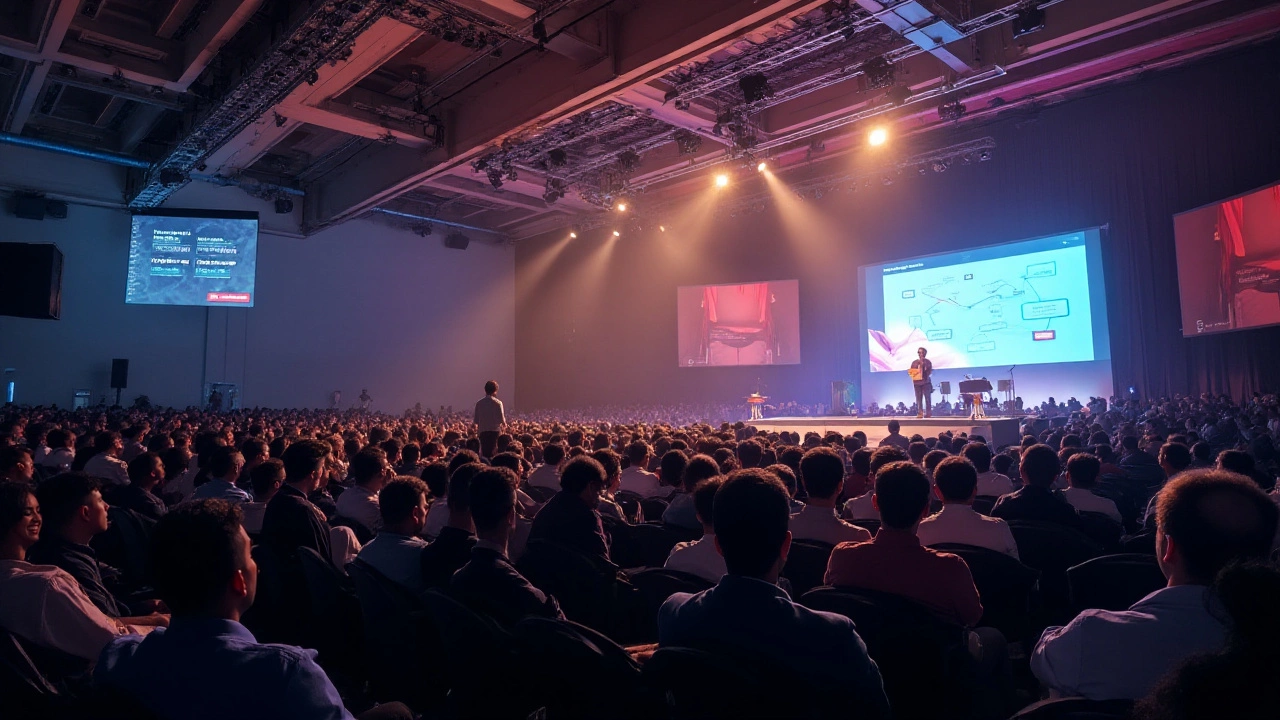Choosing Between Django and MERN for Web Development
In the constantly evolving world of web development, choosing the right framework can make or break a project. Django and MERN are two giants, each with its unique strengths and fan base. Where Django champions the cause of scalability and reliability, MERN ushers in a full-stack JavaScript dream.
This article delves into the core differences and advantages of Django and MERN, putting you in the driver's seat as you navigate your development journey. Whether you're drawn to Django's 'batteries-included' philosophy or the modern versatility of MERN, understanding these powerful tools is the key to unleashing your next great web application. Join us as we uncover what makes each framework tick and which might suit your needs best.
- Understanding Django Framework
- Exploring MERN Stack
- Choosing Based on Project Needs
- Future Trends in Web Development
Understanding Django Framework
Django is a high-level Python web framework that is known for its clean and pragmatic design. Crafted to help developers get applications from concept to completion as swiftly as feasible, Django places a strong emphasis on the DRY (Don't Repeat Yourself) principle. It's packaged with 'batteries included,' meaning it comes with numerous features right out of the box, so you focus on writing your app without reinventing the wheel.
The framework takes care of a lot of web development details, such as routing, authentication, and database interactions. Among its most celebrated components is the Object-Relational Mapping (ORM) system that lets you query the database using Python code rather than SQL. This simplifies the process significantly, enabling a tighter integration between your database and your application code. Django advocates quick development with its extensive library of reusable components, and it's supported by a vibrant community constantly contributing articles, discussions, and plugins.
Security is another area where Django shines, thanks to its built-in protection against many vulnerabilities like SQL injection, cross-site scripting, and request forgery. As a framework, it enforces best practices in web security and guides developers toward the right direction, without them having to be security experts. As Simon Willison, co-creator of Django once said,
"The ultimate goal of Django is to make it easier to build web applications—whether you're running a web service for millions of users or just trying to automate some tasks on your personal site."
For developers working on large-scale web applications, Django offers scalability and robustness with its ability to quickly handle growth while maintaining performance. This is why prominent sites like Instagram and Pinterest rely on Django to manage massive user bases and their operations. Perhaps its greatest advantage is the fully functional admin interface that Django automatically generates, providing developers with a powerful backend for managing content—a feature that significantly reduces time and effort during development.
In the following table, you'll see some statistics highlighting why Django is a preferred choice among developers:
| Feature | Popularity % |
|---|---|
| Scalability and Reliability | 85% |
| Security Features | 80% |
| Admin Interface | 75% |
With its deep-rooted Python heritage, Django is often the go-to framework for developers who appreciate simplicity and the power of the Python language. If your project requires a strong back-end solution with a dynamic community and lots of premade tools at your disposal, Django might just be the framework you are looking for. Still, like any technology, it's vital to weigh all factors against your specific needs and resources to make the best choice.

Exploring MERN Stack
The MERN stack has gained a fervent following among developers, especially those who thrive in the JavaScript ecosystem. MERN stands for MongoDB, Express.js, React, and Node.js. Each component plays a pivotal role, creating a comprehensive full-stack framework. Imagine working in a world where you don't have to switch languages between front-end and back-end. That's the beauty of MERN: it allows the use of JavaScript throughout, streamlining the development process significantly. Whether it's working on the user interface with React or managing databases with MongoDB, developers enjoy a seamless experience that reduces complexity and errors.
At the heart of the MERN stack, MongoDB offers a modern way to manage data. It's a NoSQL database, which means it stores data in flexible JSON-like documents. This adaptability enables developers to pivot and adjust rapidly as application demands shift. MongoDB's schema-less design supports changes in real-time, crucial for startups and projects in fast-paced industries. This flexibility doesn't exist in traditional relational databases, making MongoDB a favorite among tech innovators. Coupled with the potent backend service provider, Node.js, which excels in handling numerous requests efficiently, the MERN stack embodies agility and performance.
Express.js simplifies building web applications on top of Node.js. It acts as a lightweight, unopinionated, yet robust framework that developers use to create APIs with ease. Express.js is purposely minimalistic, giving developers the choice of structure and modular components. One particularly notable aspect of Express.js is the middleware. Middleware functions can process request objects, responses, and even end the request-response cycle. Its ability to handle errors gracefully and efficiently is a major reason why developers gravitate towards Express.js when constructing seamless web applications.
React is the face of the MERN stack's front-end user experience. Created by Facebook, its strength lies in reusable components, which ensure both consistency and speed in application development. React allows developers to design engaging user interfaces by using the concept of virtual DOM. This reduces the time-consuming DOM manipulation, considerably improving application performance. Developers often embrace React for its one-way data flow pattern, which enhances predictability and makes debugging a much simpler task. It shines when building single-page applications where responsiveness and dynamic content updates are critical.
MongoDB’s scalability and Express.js’s simplicity have empowered developers globally. When combined with React’s component-driven development and Node.js’s event-driven architecture, the MERN stack becomes a force to reckon with in modern web development.
Looking ahead, experts anticipate a continued rise in web development frameworks that capitalize on JavaScript’s ubiquity. The MERN stack's proficiency comes not just from its components but also the active open-source community that supports its growth. Harnessing the stack means tapping into a collective pool of shared knowledge, passionately refined and expanded upon by developers worldwide. For those investing in a future of intuitive and balanced applications, the MERN stack represents a fulfilling journey into the depth of digital innovation.

Choosing Based on Project Needs
When standing at the crossroads of Django and MERN, understanding the project's core demands becomes crucial. Every application has its unique personality, be it a robust content-driven platform or a dynamic, client-side application. Django, a high-level Python web framework, is celebrated for its simplicity and pragmatic design. Often dubbed as the 'framework for perfectionists with deadlines,' it outshines when the project requires a quick development timeline without compromising reliability. Its ORM (Object-Relational Mapping) layer simplifies database interactions, making it perfect for businesses that handle significant data transactions and complex queries.
Contrastingly, the MERN stack revels in its JavaScript ecosystem, comprising MongoDB, Express.js, React, and Node.js. It's a dream team for developers looking to create swift, responsive, and interactive web applications. The stack's architecture facilitates seamless data flow between client and server, a factor that cannot go unnoticed in today's age of single-page applications (SPAs). The lure of MERN lies in its full-stack approach, offering JavaScript enthusiasts a unified language throughout their project.
"The right framework should complement your project's strengths and fulfill its requirements rather than bending it to fit," notes Sarah Johnson, a seasoned software engineer with numerous high-profile deployments under her belt.
When deciding on the right path, consider the team's expertise. Developers well-versed in Python will likely lean toward Django, appreciating its straightforward approach to development and robust community support. Meanwhile, a team proficient in JavaScript might find MERN to be the better fit, given its end-to-end development capability in a singular language. Take stock of the project's scalability needs. While Django is known for seamlessly supporting intricate applications, thanks to features like caching and efficient database management, MERN can efficiently handle high concurrent users with non-blocking architecture.
Lastly, future maintenance is a factor not to be ignored. Apps built with Django tend to require less maintenance due to the clarity of its codebase. Meanwhile, MERN offers a modern feel with reusable components thanks to React, albeit requiring a rigorous approach to keeping dependencies updated. The decision, therefore, stands not just on technical grounds but familiarity, scalability needs, and future maintenance expectations. Reflecting on these aspects can significantly narrow your choice between these formidable frameworks.

Future Trends in Web Development
The digital landscape is rapidly evolving, and web development is no exception. As we look forward, several intriguing trends are poised to reshape how developers approach building applications. One of the most significant shifts involves the increased adoption of AI-driven development tools. These tools promise to automate mundane coding tasks, allowing developers to focus on creative and strategic aspects of their projects. By leveraging machine learning algorithms, developers can experience enhanced productivity and innovation. Django and MERN frameworks have started incorporating AI capabilities to streamline development processes and optimize code efficiency. As these features proliferate, expect to see more intelligent applications that cater to user needs with precision and speed.
Another transformative trend is the rise of the 'No Code' and 'Low Code' platforms. These solutions are democratizing web development, enabling non-developers to create complex applications without extensive coding knowledge. While Django and MERN are traditionally favored by those with a stronger coding background, they are also benefiting from this trend. Many developers are exploring integrations with no-code tools to expedite the development process and empower teams with varying technical expertise. This democratization is leading to a surge in innovative ideas brought to life by people outside the typical developer demographic.
Web development is also seeing a substantial shift towards Progressive Web Apps (PWAs). PWAs are increasingly becoming the go-to solution for those looking to provide a mobile app-like experience without the hassle of app store submissions. As the demand for seamless user experience grows, developers using frameworks such as MERN are tapping into the potential of PWAs to provide fast and reliable user interactions. Enhanced caching mechanisms, offline capabilities, and responsive designs are at the forefront of this trend. By embracing these advanced features, developers are setting themselves apart in a competitive market.
When it comes to data management, GraphQL continues to gain traction as a powerful alternative to traditional REST APIs. Developers are favoring GraphQL for its ability to provide efficient data retrieval and its flexibility in handling complex queries. While both Django and MERN are well-equipped to integrate GraphQL, its growing popularity indicates a shift towards more dynamic and responsive data fetching methods. The adaptability offered by GraphQL helps developers create more fluid interfaces and a richer user experience, which are becoming increasingly important in modern web applications.
According to a report by Gartner, "By 2026, 80% of technology products and services will be built by those who are not technology professionals." This poignant prediction underscores the paradigm shift within web development and points towards a future where technical constraints are significantly reduced.Furthermore, the push towards greater web accessibility is crucial in a world where inclusivity is not just a value but a necessity. Web developers are now prioritizing designs and functionalities that are accessible to everyone, including individuals with disabilities. This shift is not only ethical but also in line with legal standards that several countries are starting to enforce. The MERN stack, with its flexibility, and Django’s robust security features, make it easier for developers to comply with these standards and build accessible applications out of the box.
Finally, the concept of serverless architecture is another area driving future web development trends. This architecture eliminates the need for server setup and maintenance, allowing developers to run code based on event triggers while paying only for the execution time. The serverless approach is gaining traction due to its scalability and cost-effectiveness, making it an attractive choice for web applications built on both Django and MERN. As we move forward, developers who can skillfully harness these trends will be at the forefront of innovation in web development, crafting seamless, intelligent, and inclusive applications that redefine user experiences.





